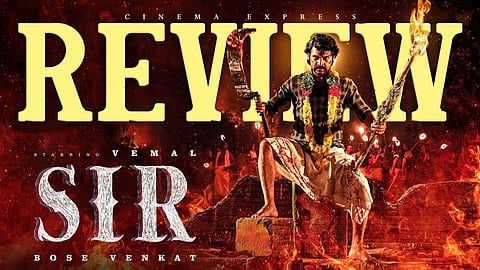SIR Movie Review: This social drama about education needs course correction
SIR(2 / 5)
Writer-director Bose Venkat’s SIR is a film with the noble intentions of a bona fide social reform drama, but it falls short of effectively delivering its message. It poses a provocative question: In a society plagued by corruption and religious extremism, can a teacher truly be a catalyst for positive change? It tries to answer this question through the story of a father (Saravanan) and son (Vemal) who want to bring true, quality education to their village. Social miscreants stand in their way because they believe that once educated, the villagers could pose a threat to their power. After all, education will enlighten one enough to differentiate between a religious zealot and a harmless believer. However, the film's heavy-handed exposition often undermines the storytelling, leaving viewers bombarded with information rather than engaged with the narrative. There is plenty of sermonising about the importance of education, a revenge subplot you can see coming from a mile away, and melodrama.
Director: Bose Venkat
Cast: Vemal, Saravanan, Chaya Devi, Rama, Sirajudeen S
The characters are one-dimensional, and the excessive background music unnecessarily dials up every emotion, but even these pale in comparison to the film's other problems. The major dealbreaker is the contradiction between its message and its narrative. Initially, the film positions a teacher as a figure of immense societal importance, akin to a God. Later, it shows a teacher reverting to violence, directly contradicting the earlier message of reverence. Ultimately, it is up to the makers of the film to convey the story they want to tell, whether or not you agree with it. Let us assume that the milieu of SIR is such that there are no alternative solutions to its central class conflict, such as legal or peaceful means of resistance. But then again, why glorify violence in a way that is counterproductive to the same values it propagates? Actions speak louder than words.
There are also problems that affect the peripheral aspects of the story. For instance, Vemal plays a character who comes to his father’s village to take his place as a teacher in the school. In one of the film’s bizarre contradictions, a female teacher (Chaya Devi) falls in love with him in spite of his voyeuristic approach towards her. Vemal's natural charisma makes his character initially endearing, but the film's portrayal of his voyeuristic behaviour as harmless mischief is problematic. The film also requires Vemal to do some heavy lifting, but he does not measure up to the enormity of the task. The writing also does not help, with his character transformations coming across as jarring contrivances.
In another bizarre plot element, a doctor declares an old man mentally unstable after he develops a traumatic brain injury (TBI), and he comes home, restrains himself with a chain, and sleeps outside his home. The man’s family is visibly sad about the developments, but they also go about their daily lives even as he keeps rotting away outside their doorstep. None of them care enough to ask the man to unrestrain himself and step inside. The depiction of mental health is unfortunately stereotypical, perpetuating harmful misconceptions.
Now, the factor that works best in SIR is the cinematography. Iniyan J Harish brings the vastness and beauty of the village with breathtaking landscape shots. Some of the indoor shots are also stunning, especially one where Vemal and Chaya Devi throw romantic gazes at each other as natural lights and shadows fall on the school wall. There are also earnest performances from Sirajudeen S, Saravanan, and Rama, although it is hard to care for their exaggerated characters.
The film explores themes of social inequality and the importance of education, but its violent resolution and simplistic characterisation undermine its potential as a social reform drama. If there is anything that requires reformation, it is perhaps the film itself.

